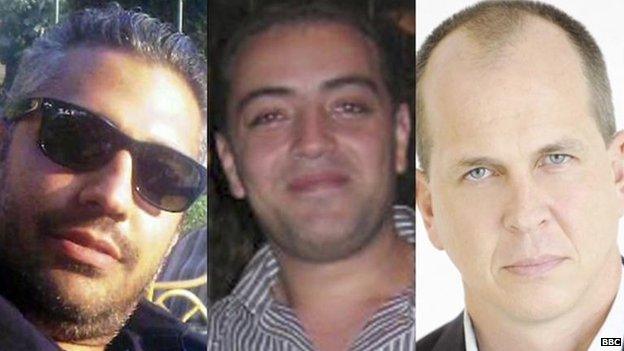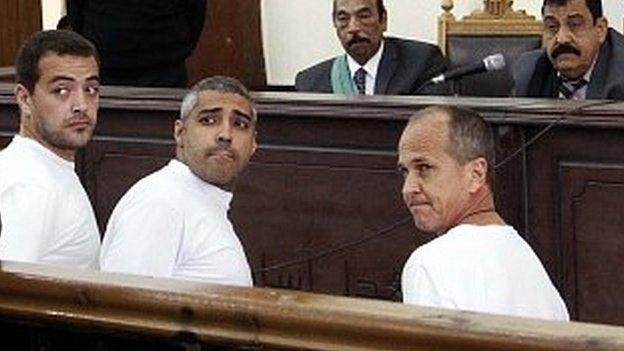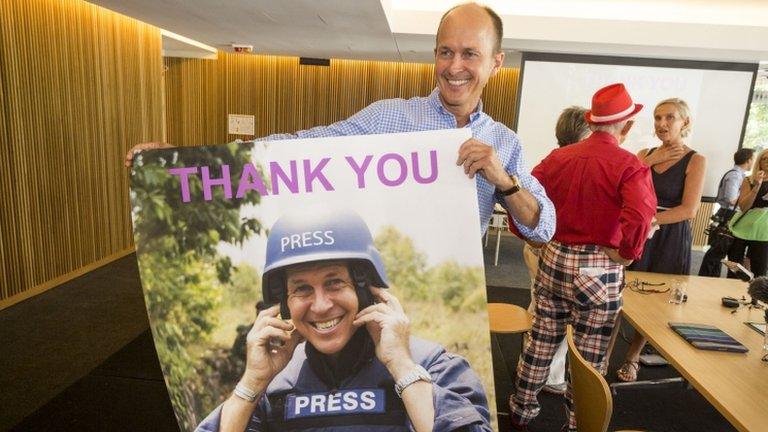Peter Greste released: Journalist 'will not rest' until colleagues freed in Egypt
- Published
Peter Greste's family spoke of their happiness at the journalist's release from a Cairo prison
Al-Jazeera journalist Peter Greste will not rest until his colleagues are released from prison in Egypt, his family says.
After 400 days behind bars, Mr Greste was freed and deported on Sunday. He landed safely in Cyprus, on his way to his native Australia.
Arrested in 2013, he was tried on charges that included spreading false news and aiding the Muslim Brotherhood.
Two al-Jazeera colleagues, Mohamed Fahmy and Baher Mohamed, remain jailed.
Mr Fahmy, who holds dual Egyptian and Canadian citizenship, could be freed if he renounces his Egyptian nationality, presidential sources say.
But there are still concerns about Mr Mohamed, an Egyptian who holds no dual nationality.
Mr Greste spoke about his concerns for his colleagues to his family after his release.
'Small cogs'
Speaking at a press conference in the Australian city of Brisbane, brother Andrew Greste said: "We want to acknowledge that Peter's two other colleagues are still there."
His father Juris Greste said that they felt very deeply for those left behind.
Andrew Greste also thanked all those who had supported his brother and worked for his release.
"We are small cogs in this massive campaign," he said.
Australian Foreign Minister Julie Bishop said Peter Greste had told her in a telephone conversation he was eager to return to his family in Brisbane.
"From my discussion with him, he was very keen to be back on a beach and lying in the sun in Australia," Ms Bishop added.

Timeline: Journalists' detention

Mr Fahmy (left) and Mr Mohamed remain in jail
29 December 2013: Peter Greste and Mohamed Fahmy arrested in police raid on Cairo's Marriott Hotel. Baher Mohamed later arrested at home
29 January 2014: 20 people including the three journalists referred to trial, charged with spreading false news, belonging to a terrorist organisation and operating without a permit
22 February: First court appearance of the three journalists
23 June: Defendants sentenced to seven years, with Baher Mohamed receiving an additional three years
12 November: President Sisi signs decree allowing repatriation of foreign prisoners
1 January 2015: Highest court orders retrial, but the three journalists not allowed bail
1 February 2014: Peter Greste freed and deported, his two colleagues remain behind bars

The three journalists had been accused of collaborating with the banned Muslim Brotherhood after the overthrow of President Mohammed Morsi by the military in 2013.
All the defendants denied the charges against them and said their trial was a sham.
Mr Fahmy and Mr Greste were sentenced to seven years in prison and Mr Mohamed to 10. Their convictions were overturned on 1 January, but the men remained in custody pending a retrial.
'Overjoyed'
Mr Greste's release on Sunday came after a long international campaign.
His mother, Lois Greste, said she had been quietly dreaming about his release. "I think he will recover well," she added.
Andrew Greste told BBC Breakfast that "to know that Peter's out of Egypt and in a safe place is just indescribable".
His brother was "in good mental and physical shape", and was "overjoyed" to be released, he added.
Orla Guerin: "Peter Greste and his colleagues insist that the only thing they are guilty of is doing their jobs"
The first hints of Mr Greste's release came in November, when President Abdul Fattah al-Sisi said he was considering granting pardons to the two foreign al-Jazeera journalists.
He had earlier signed a decree on repatriating foreign prisoners.
A recent thaw in relations between Egypt and Qatar - which owns the al-Jazeera network - is also believed to have helped pave the way for Mr Greste's freedom.
UK Foreign Secretary Philip Hammond welcomed the decision to release Mr Greste.
However, he expressed concerns that Mr Greste's two colleagues remained in jail, adding: "It also appears that charges remain against the other journalists convicted in absentia, including British nationals Dominic Kane and Sue Turton."
Mr Hammond said he called on the Egyptian authorities to review their sentences "as a matter of urgency".
"I call on the Egyptian government to take further action to ensure the release of other journalists from prison, to release political detainees and to relax restrictions on civil society," Mr Hammond added.
According to campaign group Reporters Without Borders, there are currently 165 journalists , externalimprisoned around the world, in countries including China, Iran, Eritrea, Egypt, Uzbekistan and Russia.
- Published13 February 2015

- Published2 February 2015
